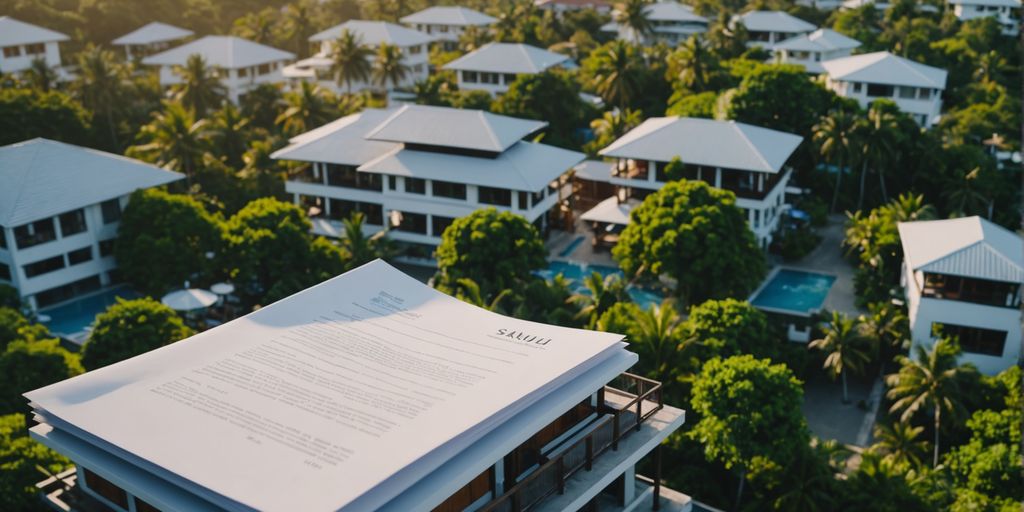Navigating the legal landscape of property acquisition in Koh Samui can be complex, especially for foreign investors. Understanding the local regulations, conducting thorough due diligence, and seeking professional legal advice are crucial steps to ensure a smooth and secure transaction. By familiarizing yourself with the specific laws and requirements, you can make informed decisions and protect your investment. Whether you are looking to buy a house, condominium, or land, taking the time to understand the legal framework is essential.
Key Takeaways
- Foreigners cannot directly own land in Samui but can own a house or condominium through leasehold or freehold arrangements.
- Conduct thorough due diligence, including title deed verification and checking for encumbrances, before purchasing property.
- Hiring a qualified lawyer is essential to navigate the legal complexities and ensure all documents and fees are in order.
- Understanding the financial considerations, such as transfer fees, taxes, and financing options, is crucial for budgeting your investment.
- Familiarizing yourself with local laws and regulations will help you avoid common pitfalls and protect your investment.
Legal Framework for Foreign Property Ownership

Leasehold vs Freehold
Foreigners looking to buy property in Samui must navigate between leasehold and freehold ownership structures. Leasehold ownership allows foreigners to lease land for up to 30 years, with options to renew for additional terms. This method provides a legal way to use the land without owning it outright. On the other hand, freehold ownership is generally restricted to condominium units, where foreigners can own up to 49% of the total floor area of the building.
Condominium Ownership
Foreigners can legally own condominium units in Samui, provided that the total foreign ownership in the building does not exceed 49%. This form of ownership is popular due to its simplicity and the ability to obtain a freehold title. It is essential to verify that the condominium project complies with the Condominium Act to ensure a smooth transaction.
Restrictions on Land Ownership
Foreigners are generally prohibited from owning land in Thailand. This restriction aims to maintain control over the country’s land and resources. However, there are exceptions, such as owning land through a Thai spouse or inheriting land. Foreigners can own buildings and structures on the land, but not the land itself. This distinction is crucial for those looking to invest in property in Thailand.
Due Diligence Before Purchase
Before finalizing any property purchase, it is crucial to have your legal representative conduct all necessary legal checks, commonly known as due diligence. This process ensures that the property is free from legal issues and that the seller is legitimate. The main areas of consideration include the following:
Title Deed Verification
Verifying the title deed is essential to confirm that the title is legitimate and that the seller is the legal owner of the property. This step helps prevent future disputes over property ownership.
Checking for Encumbrances
It is important to check for any encumbrances, such as outstanding debts or legal issues, that may affect the property. This ensures that you are not inheriting any financial or legal burdens.
Seller Identity Verification
Verifying the identity of the seller is a critical step to ensure that you are dealing with the rightful owner. This includes checking identification documents and any relevant legal records.
Conducting thorough research on the property and the seller before making a purchase is essential. This includes checking for any outstanding debts or legal issues, as well as visiting the property to ensure that it is in good condition. Engage a property lawyer to do due diligence work for you.
Essential Documentation
Title Deed (Chanote)
The Title Deed (Chanote) is the most secure and recognized form of land title in Thailand. It provides the holder with full ownership rights and is essential for any property ownership transaction. Ensuring the title deed is accurate and free from disputes is crucial for a smooth registration process.
Sales Agreement
The Sales Agreement is a legally binding contract between the buyer and the seller. It outlines the terms and conditions of the sale, including the purchase price, payment schedule, and any contingencies. Both parties must sign this document, and all copies must be acknowledged as authentic.
Foreign Exchange Transaction Form (FETF)
The Foreign Exchange Transaction Form (FETF) is required for transferring funds from abroad to Thailand. This document is essential for foreign buyers to prove that the money used for the purchase was brought into Thailand legally. The FETF must be presented at the Land Office during the registration of the property.
Ensuring all documentation is accurate and complete is crucial for a smooth registration process.
Summary of Essential Documents
| Document | Description |
|---|---|
| Title Deed (Chanote) | Secure land title providing full ownership rights |
| Sales Agreement | Contract outlining terms and conditions of the sale |
| Foreign Exchange Transaction Form (FETF) | Proof of legal transfer of funds from abroad to Thailand |
Please note that notarization of documents isn’t required by law in Thailand. However, all parties named on the deed must sign the purchase agreement, and all copies of documents must be acknowledged as authentic copies of the original.
Role of Legal Counsel
Importance of Hiring a Lawyer
Engaging a qualified lawyer is crucial when purchasing property in Samui. A reputable law firm remains impartial while protecting your interests. During the buying process, your lawyer will conduct due diligence, including title searches and contract reviews. They will ensure that the contract benefits both the buyer and the seller, and include, amend, or remove relevant conditions or clauses. This is particularly important when dealing with high-value properties, where the stakes are much higher.
Conducting thorough research on the property and the seller before making a purchase is essential. This includes checking for any outstanding debts or legal issues, as well as visiting the property to ensure that it is in good condition. Engage a property lawyer to do due diligence work for you.
Legal Fees and Costs
Legal fees and costs can vary significantly depending on the complexity of the transaction and the reputation of the law firm. It’s essential to budget for these expenses early in the process. Typically, legal fees can range from 1% to 3% of the property’s purchase price. Some firms may offer a flat fee for standard services, but additional costs may arise for more complex issues.
Navigating Legal Complexities
Your choice of lawyer can make or break your property deal. A trusted property lawyer will save you time, prevent frustration, and help you avoid potential financial loss or litigation. They are the experts who will guide you through the complexities of Thai property laws, ensuring that your interests are protected. For instance, if you’re purchasing a luxury 6-bedroom villa with stunning sea view in Koh Samui, Thailand, a qualified lawyer will help you navigate the legal intricacies involved.
Financial Considerations
When purchasing property in Samui, understanding the financial considerations is crucial. Proper financial planning can save you from unexpected costs and ensure a smooth transaction process.
Tax Implications
Property Taxes
When purchasing property in Samui, understanding the various property taxes is essential. Stamp Duty is 0.5% of the appraised value and is only payable if the property is exempt from Business Tax. This tax is often overlooked but can add a significant amount to the total cost. The Transfer Fee is typically 2% of the appraised value of the property. This fee is usually shared between the buyer and the seller, but the exact split can be negotiated.
Income Tax on Rental Income
If you plan to rent out your property, you will be subject to income tax on the rental income. The tax rate can vary depending on your total income and other factors. Proper financial planning can help you manage these costs effectively.
Capital Gains Tax
Capital Gains Tax is applicable if you sell your property at a profit. The rate can vary, and it’s crucial to consult with a tax advisor to understand your obligations. Business Tax is 3.3% of the appraised value and is applicable if the property is sold within five years of purchase. This tax can be a substantial cost for those looking to flip properties quickly.
Proper financial planning can save you from unexpected costs and ensure a smooth transaction process.
Steps to Register Property at the Land Office
Registering the property at the Land Office is a mandatory step to ensure the transfer of ownership is legally recognized. This process involves several key steps and requires meticulous attention to detail to avoid any legal complications.
Required Documents
To register a property in Samui, you must gather all necessary documents. This includes the title deed at the land office where the property is located, proof of identity, and any relevant sale agreements. Ensure that all documents are in order to avoid delays.
Registration Process
The registration process begins at the local land office. The transfer of ownership requires a 30-day public announcement of the sale at specified locations. After this period, the transfer is completed by the local land office. It’s important to note that ownership of a house on land owned by someone else is relative to the right to use the land, such as a land lease or the right of superficies term.
Timeline and Costs
The timeline for registering property can vary, but it generally takes about 30 days from the start of the public announcement to the completion of the transfer. Costs associated with the registration process include transfer fees and taxes, which can vary depending on the value of the property. For instance, a modern design 3 bedrooms villa priced at THB 10,900,000 would incur specific fees and taxes based on its valuation.
Ensuring all documentation is accurate and complete is crucial for a smooth registration process.
Legal Restrictions and Compliance
Zoning Laws
Zoning laws in Samui are designed to regulate land use and ensure that development is in line with the island’s planning objectives. These laws dictate what types of buildings can be constructed in specific areas, and any deviation requires special permission from local authorities. Failure to comply with zoning laws can result in hefty fines and legal action. For instance, certain areas may be designated for residential use only, prohibiting commercial activities such as short term rentals.
Building Regulations
Before commencing any construction, it is mandatory to obtain a building permit from the local land office. The permit will only be issued if the proposed construction adheres to existing building and environmental regulations. These regulations are subject to change, so it is crucial to consult with your architect or design team to ensure compliance. Non-compliance can lead to the suspension of construction activities and legal penalties.
Environmental Compliance
Environmental compliance is another critical aspect of property development in Samui. Projects must adhere to environmental laws designed to protect the island’s natural resources. This includes measures to prevent soil erosion, manage waste, and protect water quality. Ignoring environmental regulations can result in severe consequences, including project shutdowns and legal repercussions.
Ensuring compliance with all legal restrictions is not just about avoiding penalties; it is also about contributing to the sustainable development of Samui.
Common Pitfalls and How to Avoid Them
When purchasing property in Samui, there are several common pitfalls that buyers should be aware of to ensure a smooth transaction. Being aware of these pitfalls and taking proactive steps can save time, money, and legal headaches.
Tips for Foreign Investors
Understanding Local Laws
It is crucial for potential investors to thoroughly research and seek professional legal advice to ensure compliance with local regulations. By doing so, foreigners can successfully invest in this beautiful island and enjoy the benefits of owning property in one of Thailand’s most sought-after destinations.
Engaging Local Experts
Setting up a Thai limited company is a popular method for foreigners to invest in property. The company must have a majority of Thai shareholders, and it must operate as a legitimate business. This means holding annual shareholder meetings, filing yearly balance sheets, and maintaining correct accounting practices. The Thai government has been cracking down on companies that are set up solely for the purpose of circumventing foreign ownership laws. Therefore, it is essential to work with legal and financial experts to navigate these complexities.
Long-term Investment Strategies
Foreign investors should consider long-term strategies when investing in property in Samui. Options such as leasehold agreements, where foreigners can lease land for up to 30 years with options to renew, are common. Another method is through setting up a Thai limited company, where the foreigner can hold up to 49% of the shares, while the remaining 51% must be held by Thai nationals. This method, however, has its complexities and legal requirements.
By understanding local laws and engaging local experts, foreign investors can create a very safe structure for their investments.
Highlights
- ultimate sunset serenity at lipanio beachfront villa – ocean worldwide. tranquil beachfront property with investment options. private, serene, and exclusive. contact for details and viewings.
Case Studies of Property Transactions in Samui

Successful Transactions
One notable example is the title: sea view balinese villa – ocean worldwide. This 3-bed, 4-bath villa in Koh Samui was listed for THB 14 million. The transaction was smooth, with all legal requirements met, showcasing the efficiency of the local real estate market.
Legal Disputes
In another case, a foreign investor faced challenges due to incomplete documentation. The lack of a verified title deed led to a prolonged legal battle, emphasizing the importance of thorough due diligence.
Lessons Learned
From these cases, it is evident that engaging local experts and understanding the legal framework are crucial. Foreign investors should prioritize verifying all documents and seeking professional legal advice to avoid potential pitfalls.
Conclusion
Navigating the legal landscape of buying property in Samui can be complex, particularly for foreign investors. Understanding the specific legal requirements, conducting thorough due diligence, and seeking professional legal advice are essential steps to ensure a smooth and secure transaction. By familiarizing yourself with the local regulations and financial considerations, you can make informed decisions and protect your investment. Whether you are looking to purchase a house, condominium, or land, taking the time to understand the legal intricacies will help you achieve a successful property acquisition in Samui.




